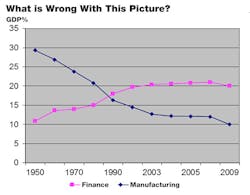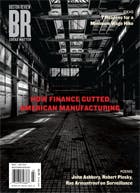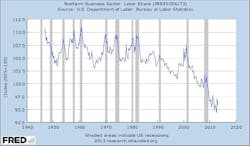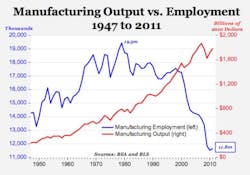The Financialization of the Economy Hurts Manufacturing
Free-market capitalism says that the only purpose of business is to create shareholder value and that the unfettered market can regulate itself. In the last 30 years, that definition changed to, “the only purpose of business is to create shareholder value measured by short-term results and with little or no regulation."
This is no longer the capitalism described by Adam Smith; it is financialization -- defined as the “growing scale and profitability of the finance sector at the expense of the rest of the economy and the shrinking regulation of its rules and returns."
In recent years, as New Deal regulations were slowly dismantled, financial sector growth accelerated along with high risk-taking and speculation. The employment and total sales of the finance industry grew from 10% of GDP in 1970 to 20% by 2010. The focus of the economy was no longer on making things; it was on making money from paper. The finance industry swelled as the rest of the economy weakened.
One of the big problems caused by finance rising and manufacturing sinking is that a low-employment industry replaced a high-employment industry. At its peak, in the mid-twentieth century, manufacturing generated 40% of all profits and created 20% of the nation’s job. Today finance controls 40% of the nation's profits with 5% of the jobs.
This tremendous growth has led to a tremendous increase in economic and political power. This power and the fact that Wall Street is the banker of most public corporations has given them control over major sectors of the economy, especially manufacturing. In the past, Wall Street was comprised of banks that financed manufacturing's capital investment and R&D, which made America great.
However, after deregulation, Wall Street became the masters of manufacturing, demanding short-term profits rather than funding the strategies that led to long-term growth. Wall Street’s demand for short-term profits forced most manufacturers to slim down their organizations and eliminate the functions that did not show a quick ROI.
Financialization is only about making money from money; it has nothing to do with creating jobs or shared prosperity and, as a result, it has had a devastating effect on manufacturing. In his article, "Wall Street’s Police State," Les Leopold says, “financial corporate raiders swooped in to suck the cash flow out of healthy manufacturing facilities. Wall Street, freed from its New Deal Shackles, loaded companies up with debt, cut R&D, raided pension funds, slashed wages and benefits, and decimated good paying jobs in the U.S. while shipping many abroad.”
The lobbyists for the financial industry were able to remove all of the laws and regulations created during the New Deal. This allowed Wall Street to use many new quick-buck methods such as derivatives to make money from money and have all of their gambling protected by American taxpayers. Allowing finance to gamble with depositor’s money was a terrible decision that led to the crash of 2008 and will lead to another crash in the future unless they can be stopped.
Today finance controls 40% of the nation's profits with 5% of the jobs.
This stripping down of companies to their core competencies has been forced on most of the large publicly held corporations to some degree. But in stripping them down, many critical functions have been lost. For example, apprentice-type training has been lost in many American corporations because it is long-term training and doesn’t have a good enough short-term ROI. Basic research, funding to bring innovation to scale, and diffusion of new technologies to suppliers, have also been dropped or reduced, because they are seen by the shareholders as being peripheral to the core competencies.
If innovation is the critical strategy that will keep America in the race and its position as global leader, how can it happen without long-term financial support?
The growth of financialization also begs another important question. If innovation is the critical strategy that will keep America in the race and its position as global leader, how can it happen without long-term financial support? This is a very strategic question because most innovation comes from the R&D and new technologies created by manufacturers.
Wall Street has the upper hand and continues to focus on short-term profits, rather than investing in manufacturing and the country’s infrastructure. It is hard to see how American manufacturing will be able to compete with the rest of the world like we did in the twentieth century.
William Levinson summarizes the problem in his article in Industry Week: “The disease killing America’s economic health is financial planning, and one of the symptoms is the loss of the U.S. manufacturing base. Industry is the foundation of military as well as economic power, so the transferring of American manufacturing capability to China is extremely dangerous.”
If we are going to have a chance at reversing the decline of manufacturing or developing a strategy of innovation that will keep the U.S. competitive, the current direction of the financial industry must be changed. In its pursuit of short-term profits, they are jeopardizing the long-term health of the economy and the manufacturing sector.
As an industry, finance does not deserve the trust of the American people. Consider just some of their more recent scandals:
-
Private equity and corporate raiding: Corporate raiders contributed to inequality as they dismembered firms, laid off workers, auctioned off the assets and destroyed entire communities to reap huge rewards for few stakeholders.
The corporate raider approach to making huge returns in a short-period of time was very popular with the wealthy and was viewed as necessary part of free-market capitalism (the elimination of the weak). However, some economists believe that every point gained in financialization leads to deeper inequality, slower growth and higher unemployment.
- Credit: As regulations slowly collapsed along with oversight of consumer and mortgage lending, Wall Street introduced predatory lending in the form of high-interest-rate credit cards with fees and penalties, payday loans and subprime mortgages. The predatory lending practices “preyed on the poor and made them poorer.”
- Housing bubble: Big finance bundled bad mortgages and packaged them as toxic securities to be sold all over the world. The bubble bursting forced the economy off the cliff and into the great recession, but nobody went to jail, the shareholders paid the government fines and the taxpayers were forced to bail them out.
- Public Infrastructure: Another problem created by financialization is that there is less money available for government investment in the real economy. One study suggests we need $3.6 trillion to finance the repair or replacement of highways, bridges, sewer, water, and electrical transmission systems.
Can Financialization be Sustained?
I don’t think so.
Outside of the finance industry, the average worker has not been doing very well. The share of income going to the average worker has been shrinking steadily for the past 30 years, as shown in the chart below.
The problem is in aggregate demand. Although the actions of Wall Street have made the rich richer, it has done little for the average worker. This is a problem because 70% of the economy is based on consumption, and people are not consuming enough to grow the economy. Some of the people in the top 5% of earners are beginning to realize this, and even Wall Street is beginning to examine the problem.
Top income earners have benefited from wealth increases but middle- and low-income consumers continue to face structural liquidity constraints and unimpressive wage growth. "— Morgan Stanley report, "Inequality and Consumption"
Morgan Stanley in a report “Inequality and Consumption,” said, “So, despite the roughly $25 trillion increase in wealth since the recovery from the financial crisis began, consumer spending remains anemic. Top income earners have benefited from wealth increases but middle- and low-income consumers continue to face structural liquidity constraints and unimpressive wage growth. To lift all boats, further increases in residential wealth and accelerating wage growth are needed.”
It is no coincidence that the rise of financialization happened during the decline of manufacturing, middle-class income, capital investment, investment in infrastructure, and the rise of inequality.
The following graph also shows that the total employment in manufacturing grew until 1979, but has been declining steadily since this peak--and declining precipitously since year 2000. Since 1979 manufacturing has lost 8 million jobs.
It is also no coincidence that during the same period there was an enormous shift in wealth to the top 20% earners at the expense of the bottom 80%.
Perhaps the financial industry is an example of free-market capitalism at its best. But its lust for short-term profits has the power to hurt the economy and destroy the manufacturing sector.
Perhaps the financial industry is an example of free-market capitalism at its best. But its lust for short-term profits has the power to hurt the economy and destroy the manufacturing sector. It is said that these types of capitalists who continually push the legal boundaries would sell you the rope at their own hanging. The one thing that they have proved over the last 4 decades is that they must be strictly regulated. I am convinced that left to their own devices, they will cause another financial crash of the economy.
The Dodd-Frank legislation is simply not enough to stop the finance industry from repeating its past crimes, and many banks are still too big to fail. At a minimum, we need to bring back the Glass-Steagel Act that separates the standard banking and investing parts of the bank from the risky instruments like credit default swaps and derivatives, which should not be protected by the FDIC.
Wall Street controls most of the money for capital investment, technology development, and the expansion of manufacturing. The focus now is on short-term investment and making money from money, not in long-term investments that would grow the manufacturing sector. If Wall Street is well regulated and the tools used in financial engineering made illegal, manufacturing might have a chance of getting its share of the money.




